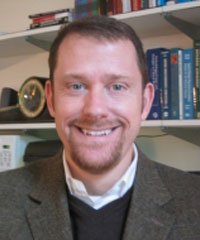Research Overview
Professor Rogge will not be accepting applications for graduate students for the 2025-2026 academic year.
Ron Rogge is a clinical faculty member whose research focuses on understanding dynamics within romantic relationships and families.
Websites for Dr. Rogge:
Basic Research
His basic research studies examine how
- Individual factors (e.g., neuroticism, anger, aggressiveness, depression, anxiety, alcohol use, and axis II pathology)
- Couples behavior with each other (e.g., communication, empathy, forgiveness, social support, humor, partner aggression, coparenting dynamics)
- Sexuality and sexual activity (e.g., sexual activity, the salience of male and female sexual health and orgasms, diversity in relationship structures - including nonmonogamous arrangements; diversity in sexuality - including traditional LGBT self-identities as well as newer classifications like heteroflexibility, gender diversity)
- Eastern ideological traditions (drawing from Buddhism and Taoism, as well as from the mindfulness and ACT literatures, we have increasingly begun incorporating mindfulness and psychological flexibility into our projects and examining how tenets of Buddhism are linked to greater wellbeing through various forms of mindfulness and emotional flexibility - the Unified Flexibility & Mindfulness model)
- Environmental factors (e.g., life stress, socio-economic status, demographics, neighborhood dilapidation, neighborhood cohesion)
- Implicit attitudes (e.g., subconscious attitudes toward a partner or family member that can shape the course of relationships)
- Health behaviors/factors (e.g., exercise, diet, sleep hygiene)
collectively contribute to the development of individual, relationships, and family wellbeing and flourishing or discord and distress.
Applied Research
In addition, Dr. Rogge's research also explores methods of preventing marital and family discord through interventions designed to strengthen relationships and families.
- Promoting Awareness, Improving Relationships (PAIR). The PAIR program is an innovative approach that encourages couples to use popular media (movies and TV shows) as a method of easing into discussions of their own relationships. PAIR offered comparable 3-year benefits to those seen with the CARE and PREP programs, cutting the divorce rate in half over the early years of marriage (Rogge et al., 2013). We now have data from an RCT of PAIR vs. a waitlist in 170 couples and are preparing manuscripts from that study.
- The Agapé Relationship Wellness App. Dr. Rogge is also on the founding team of a tech start-up company, helping to develop a smartphone app for couples that enhances their relationships by building moments of connection with just a few minutes each day. Couples using the app are sent daily prompts like, “If you were going to give your partner an award, what would it be for?” and when both partners have answered, they can see each other’s responses. Agapé can be found in the google and apple stores and has over 12,000 daily users. Dr. Rogge is currently conducting a single-arm intervention study following 320 couples through their first month of using the app.
- Reflecting to Enrich Family Life and Enhance Coparental Teamwork (REFLECT). The REFLECT program builds on the findings with PAIR, extending this innovative approach to the task of strengthening families. Thus, REFLECT encourages coparents to use popular media (movies and TV shows) as a method of easing into parenting discussions. A recent pilot study in 36 families suggested that in comparison to a no-treatment control group, families completing REFLECT discussions demonstrated more adaptive coparenting (greater cooperation and support) and greater use of adaptive parenting strategies.
- The MindFlex Assessment System. In collaboration with Kelly Wilson and Jaci Rolffs, Dr. Rogge developed a measure assessing the 6 dimensions of psychological flexibility and the 6 corresponding dimensions of inflexibility within the Hexaflex model: The Multidimensional Psychological Flexibility Inventory or MPFI. We are now validating the use of that scale in clinical populations by developing the MindFlex Assessment System. This is an online system that administers and scores the MPFI for clients in therapy, generating psychological flexibility profiles for their therapists and helping to track changes in flexibility and wellbeing across the course of treatment.
To explore these research interests, Dr. Rogge has 1) conducted a project in his own lab that followed 303 newlywed couples on a yearly basis over the first four years of marriage, 2) conducted a joint project with Dr. Reis following 175 newlywed couples over the first 18 months of marriage, and developed and implemented an innovative program of online research comprised of a series of over large-scale online research projects - see http://www.couples-research.com - that have collected data from over 70,000 online respondents, augmenting his laboratory studies of romantic relationships and families. Dr. Rogge and his students typically use advanced multivariate statistical techniques (e.g., Item Response Theory, Hierarchical Linear Modeling, Structural Equation Modeling, Multilevel SEM, Latent Profile Analysis, network analysis, meta-analysis) to examine the relationships between sets of variables being examined.
Mentoring Style
Dr. Rogge provides fairly intensive mentoring to his students to help ensure a high level of training and success. Dr. Rogge uses a blend of various mentoring styles (see below) to best meet the needs of his students, tailoring his efforts to each student as they progress through their doctoral degrees. Although Dr. Rogge’s approach to mentoring each student will grow and evolve over time as their needs naturally shift and change, the following graph gives a sense of the typical blend of mentoring styles that he engages over the course of 5 years with a student.
As can be seen in the graph, Dr. Rogge engages the roles of affirmer, protector, and clarifier sufficiently to create a safe, supportive, and caring environment. Having said that, he prefers to spend as much time as possible in the roles of educator, advisor, and ideator, as the more time he can engage in those roles with each mentee, the more his joint programs of research with them will flourish.


